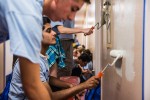UCLA students crowded into hallways with chipping taupe paint and a vegetable garden overrun with leaves and branches at a transitional veteran center Monday.
In three separate groups, about 100 UCLA students raked and painted hallways on two floors of a building in the Veterans Succeeding in the 21st Century center, as part of the sixth annual UCLA Volunteer Day.
Veterans Succeeding in the 21st Century is a transitional veteran center on Skid Row and among the new locations that more than 6,500 students visited across Los Angeles this Volunteer Day, said Rachel Corell, director of the UCLA Volunteer Center.
Veterans Succeeding in the 21st Century was specifically added as a new site to increase student interaction with the veteran community, after a long-time relationship between UCLA and the Veteran’s Administration Greater L.A. Healthcare System and the Veterans Affairs Medical Center on Wilshire Boulevard, Corell said.
The site is funded by the U.S. Department of Veterans Affairs and houses up to 78 veterans at a time, said Ben Purdue, the site’s program manager. Veterans can stay for up to two years in center housing and may receive access to money management classes, mental or physical health referrals, as well as classes on computer literacy.
Through the front office of the center, the noises of the street nearly fade away and colorful flowers and trees align pathways leading between the veterans. Outside, residents sit on benches, taking in the early morning sun along with tenants from the other buildings.
Eugene Winters, a resident at Veterans Succeeding in the 21st Century, said he saw the volunteer event as a reminder to students of what veterans do for the larger community.
“This makes me feel our young people realize a lot was put on the line so that they can go to college, have the things that we didn’t have,” Winters said.
Winters, who served as an army radio field communication expert in Korea and Vietnam, said that after leaving the army, he felt thrown back into society and was not able to find work. But because of the center, he feels that he and other veterans are able to access resources they need to enter the workforce.
“Every job told me I was either overqualified or underqualified,” Winters said. “This is a good place to learn to again stand on your feet because (veterans) are thrown into the water with no life preserver and expected to swim.”
At the center, UCLA students filed out of buses and shuffled into the dining hall to hear from Purdue about why their work was a symbolic gesture to show that veterans are not forgotten.
“We are working to (reduce) veteran homelessness,” Purdue said. “Most people just drive through Skid Row as fast as possible, but we consider this place an oasis.”
The students spent their time at the program in two long hallways painting a light mint green color over the dated taupe walls, while other students worked in a nearby garden raking, pulling weeds and moving fallen branches.
Winters said the walls of the center looked as though they had not been painted in decades. For him, having students volunteer to paint them was a morale booster.
“(Painting) will make a lot of people happy,” Winters said. “It will brighten your day to look out the door.”
Lily Fryer, a first-year international development student, said volunteering at the center allowed her to help men and women who had gone through similar situations as her grandfather, who fought in World War II.
“(Volunteering) will highlight this area of help and show that veterans are recognized in the community,” Fryer said. “It’s great to be giving back to people who give so much to our country, even to help them in a small way.”
Jack Elliott, a first-year undeclared student, said he found the experience meaningful because he has always had a deep respect for veterans. He said he was glad to be able to show it through volunteering.
“I like to see how active we are in our community,” Elliott said. “I’m hopeful this shows how much we do respect (veterans) and that we never forget and are grateful for what they did.”
For Donny Anderson, a resident at the center, UCLA student volunteers reminded him of his connections to the UCLA community.
Anderson said he joined the army at the age of 19 in 1966 as a medical records clerk looking for a way to get an education and training. Though he was not deployed during his service, he said the transitional center gives veterans a chance to share their war stories and build a community.
In 1979, Anderson spent one year at UCLA. Though he did not graduate, he said he has forever been a Bruin and he appreciated the volunteer work of UCLA students.
“I know Bruins (painted the center), and I’ll have a deeper appreciation for it,” Anderson said.
